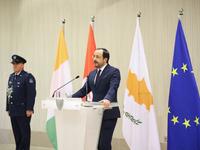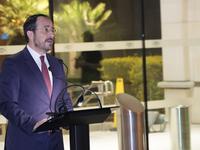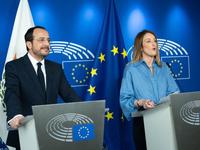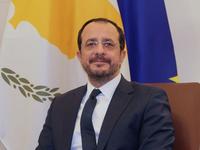Press Releases
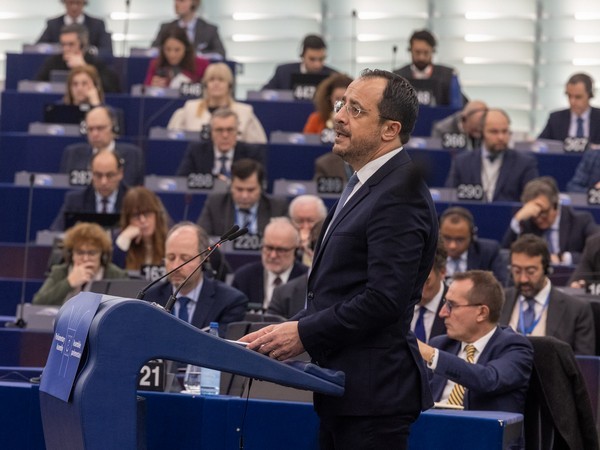
23-01-2024 17:53
Address by the President of the Republic, Mr Nikos Christodoulides, at the Plenary Session of the Parliamentary Assembly of the Council of Europe, in Strasbourg
Honourable Mr President,
Dear Friend, Theodoros Roussopoulos,
Firstly, please allow me to congratulate you on your election to the Presidency of the Parliamentary Assembly of the Council of Europe (PACE) and wish you every success in your challenging mission. Your extensive and productive political as well as professional experience in the European as well as in the Greek political scene undoubtedly serves as the best guarantee for a successful tenure.
Dear outgoing President,
Dear Friend, Tiny Kox,
I sincerely thank you for the kind and very honorary invitation you extended to me during your visit to Cyprus last July to address the Parliamentary Assembly, provding me with the unique opportunity to be here today.
Mr President,
Madam Secretary-General of the Council of Europe,
Esteemed members of the Parliamentary Assembly,
Ambassadors,
Ladies and Gentlemen,
Today I am filled with feelings of honour and responsibility.
Honour, because less than a year after my election as the President of the Republic of Cyprus, I have the privilege to address the PACE.
Responsibility, because as the President of a small, semi-occupied state, I have the duty and obligation to stand unwaveringly with those who support substantially and with deeds the Council of Europe (CoE), an institution closely linked to the defence of human rights and the establishment of Democracy and the Rule of Law in Europe and beyond.
At the same time, I am here today to underline in the most emphatic way the absolute need for the protection and further promotion of multilateralism, because I strongly believe that it is the only means we have at our disposal to advocate and ensure the principles and values advocated by the CoE and its Parliamentary Assembly, but also to address today’s multiple challenges.
Ladies and Gentlemen,
The CoE is an integral part of the ambitious vision of the pioneers of European integration. Awakened by the horror of the two great world wars and determined to heal the wounds of the past, they decisively moved forward to create a Europe where freedom and the rule of law prevail.
Through this political approach, through this perspective, the CoE has become one of the most important intergovernmental organisations, at the forefront of promoting and protecting Human Rights, Democracy, and the Rule of Law.
The historic city of Strasbourg, the CoE and this prestigious venue where we find ourselves today are familiar to me personally and to most of my compatriots. They are integral elements of our continuous, joint effort towards further European integration. They are integral elements of our relentless pursuit for collaboration and the defence of fundamental, universal principles and rights, which unfortunately, in some cases, are not guaranteed even today.
As you are well aware, in my homeland, Cyprus, for the past 50 years, we have been experiencing the tragic consequences of the violation of basic human rights and freedoms. Fifty years after the barbaric Turkish invasion in 1974 in European Cyprus, there is still occupation, there are still displaced persons, missing persons, and enclaved persons.
Honourable members,
Unfortunately, once again, at European and international levels, we are going through a period of multiple and multi-layered challenges that know no borders or nationalities. Threats to human rights, peace, democracy and pluralism, the climate crisis, the increasing migration and refugee flows, terrorism, the religious fundamentalism, the humanitarian and food crises are just some of the challenges we are called upon to address today.
In the face of these challenges and as a consequence of the aforementioned challenges, the role and importance of multilateralism, dialogue, and peaceful conflict resolution are in question. In this context, the role of the CoE, its Parliamentary Assembly, the role of us all, becomes even more important.
Ladies and Gentlemen, I strongly believe that the best and most effective response to today's challenges and threats to multilateralism is its expansion and strengthening through further and more substantial cooperation among democratic forces and those intergovernmental organisations that advocate these values.
This, I believe, is the only means at the disposal of states, at our disposal, for the defence of peace, security, and prosperity in the European continent. Our guide in this endeavour must be our shared vision for the future we want for ourselves, for our fellow citizens, and most importantly, for our children and the next generations.
In this effort, Dear Friends, undoubtedly, a leading role is played by all of you, the members of the PACE. Here, the democratic dialogue among the elected representatives of the 46 members of the CoE is actively promoted with deeds and not words, making this temple of democracy an irreplaceable bridge for consultation and cooperation among the people of Europe.
Ladies and gentlemen,
The vision of peace, pluralistic democracy, respect for human rights, and the rule of law that led to the establishment of the CoE has never been more pertinent.
We are witnessing a growing attempted erosion of rules based on international order, rising nationalism, violations of human rights, including the freedom of expression, the right to education and religious rights.
In the area of gender equality, following decades of steady progress, a backlash against women’s rights has emerged, resulting in further persisting inequalities. At the same time, violence against women in all its forms is rising, whilst sexual, health and reproductive rights of women are also being increasingly infringed upon. Furthermore, social inequality is growing and must be addressed to mitigate the consequences of current social and economic challenges.
Let me be clear and underline once more; there can be no complacency on protecting and upholding freedom and human rights in Europe.
Τhe CoE’s leadership is crucial in preventing these violations and safeguarding, inter alia, gender equality, women’s rights, the right to education and social equality. These should always be at the core of its policy priorities, using the legally binding tools at its disposal, such as the European Social Charter, the Convention on Preventing and Combating Violence Against Women and Domestic Violence, the European Cultural Convention, and crucially the European Convention on Human Rights and its protocols.
The European Court of Human Rights (ECHR) is an indispensable shield in our fight to uphold human rights, rule of law and democracy. As the prime body of overseeing Convention compliance, the Court is playing a catalytic role through its judgments in this regard. It stands as a sacred guardian of human rights in our continent, supporting our democracies and enhancing governance.
In this regard, states have a collective and unconditional obligation to fully adhere and implement the Court's final judgments. Full and non-discriminatory implementation of all judgments of the ECHR is an essential component of our efforts. Systematic non-compliance with the Court’s judgments poses a serious threat to the Court's authority, the Convention’s effectiveness, and the Council’s credibility, and by extension to rule of law, democracy, human rights. It is deeply regrettable, Ladies and Gentlemen, that a large number of the Court’s judgments on human rights violations are still not implemented in full, or even not at all, due to lack of political will. One such judgment is the 4th Interstate Case Cyprus vs Turkey, in which Ankara, as with many other cases, has failed to date to comply.
Mr President,
Esteemed members of the Parliamentary Assembly,
Ladies and Gentlemen,
From the ruins and darkness of World War II, grew a glimmer of hope and light. Multilateralism became the driver for peace and the CoE, as well as the United Nations (UN) and the European Union (EU), rose as vehicles and catalysts of cooperation and of upholding common values so that the world would never again relive the horrors of war that ravaged Europe and beyond.
Despite the progress achieved, seventy-five years since the establishment of the CoE, multilateralism is facing dire challenges. Yet again, in Europe and beyond, we are witnessing suffering from terrifying wars and horrendous atrocities.
In Europe, the illegal Russian invasion of Ukraine demonstrated that peace in Europe – and indeed the world – can never be taken for granted. From the outset of the war, Cyprus condemned Russian aggression towards Ukraine, which has led to some 10 million Ukrainians displaced and refugees. From the very beginning, Cyprus has stood in unwavering solidarity with Ukraine and its people. We reiterate our unequivocal support to Ukraine’s unity, sovereignty and territorial integrity within its internationally recognised borders. And in doing so, Ladies and Gentlemen, we stand on the right side of history.
We ought to be unequivocal in our message; we will never allow border changes stemming from violence and war. It is a matter of principle, of upholding international legality and the core tenets of the UN Charter. The threats to Europe and the world will not be deterred if we do not act decisively and in unity. It is our collective responsibility to uphold, no matter the cost, international legality.
Diplomacy is key to this end. We need to focus our attention on ending the hostilities and ensuring lasting peace in Ukraine, based on the principles of international law and the UN Charter.
Ladies and Gentlemen,
It is becoming painfully evident that there are no “frozen conflicts” and that in the absence of viable, comprehensive solution, the risk of eruption of conflict, with far reaching consequences, is real.
The current war in the Middle East, Cyprus’ and Europe’s immediate region, proves this point. The unfolding war is a litmus test for us all, not only for regional stability, but for peace and security on a global scale.
From the very beginning, we have condemned Hamas’ heinous terrorist attacks on October 7, which led to the resurgence of the current cycle of violence. Terrorism is a threat to all of us. At the same time, we should also be clear that Hamas does not represent the Palestinian people, nor the Palestinian cause. While the drama of the hostages continues, we firmly believe that the unconditional and immediate release of all the hostages is key to ending the crisis.
At the same time, while fully acknowledging Israel’s right to self-defence in line with international law, including international humanitarian law, I emphasise in the strongest terms that all civilians and civilian infrastructures must be fully protected. A tragedy with far reaching effects is evolving. We mourn the loss so many people. Our priority must continue to be the protection and the end of the suffering of so many innocent lives.
The only way forward is ensuring that there is a peace lifeline that emerges out of this war, and that means reviving the Middle East Peace Process, on the basis of a two-state solution, as reflected in the UN resolutions. In doing so, the EU, together with like-minded partners, such as the United Kingdom and the United States, as well as our Arab regional partners, must be a core part of such a strategic discussion on the basis of the Peace Day Initiative. I truly believe that this is the only guarantee for ensuring conditions of lasting peace, security and dignity, equally for Israelis and Palestinians alike, as well as preventing a wider multifront spillover.
At the same time, given the tremendous humanitarian needs of Gaza, Cyprus, the closest EU member state in the region with excellent relations with all neighbouring countries, has put forward a comprehensive initiative for a one-way maritime corridor, the Amalthea Plan. The Cyprus Maritime Corridor Initiative provides for a complementary route to existing and future routes for humanitarian assistance to be delivered for the civilians in Gaza, and I am very pleased that we have recently set the corridor in motion. It remains at the disposal of the international community for contributing to a sustainable, high volume and secured flow of humanitarian aid to civilians in the Gaza Strip.
Dear friends,
In another region, in Nagorno-Karabakh, we have become witnesses to yet another humanitarian crisis, affecting tens of thousands of people. This acute humanitarian crisis has turned into a mass exodus of the Armenian population from the region. We need to take all necessary measures to provide immediate humanitarian relief and also address the long-term situation of the ethnic Armenians of Nagorno-Karabakh. At the same time, the increased and immediate needs of Armenia, stemming from the events of last September, should be properly and adequately addressed.
Cyprus supports the normalisation and the peace process between Armenia and Azerbaijan within the framework of EU mediation, which will undoubtedly contribute to the long-term stability and prosperity of the wider region. Any incentives to facilitate and encourage such development should be balanced, and carefully planned and implemented.
Dear friends,
The aforementioned crises and tragedies clearly illustrate that prolonged political stalemates should not be treated with complacency. The absence of diplomacy and dialogue can breed cycles of perpetual violence with catastrophic repercussions.
It is a reality that there are no “frozen conflicts.” As I have mentioned, the vacuum created by the absence of viable, lasting peace becomes a fertile ground for crises. This is something we know very well in my country. Human rights in Cyprus remain an unfulfilled promise for all Cypriots, as a result of the illegal invasion of Turkey in 1974 and the continued occupation.
2024 marks the 50th anniversary of the Turkish invasion, 50 years of continued, illegal occupation. Five decades of division, continuous violations of fundamental freedoms and basic human rights on the European continent cannot continue.
Always, but especially in anniversaries such as this, my thoughts are constantly with the hundreds of thousands of Cypriots who were displaced and year after year wait for the moment that they will return to their homes. They are with the families of the missing persons that desperately seek for information on the fate of their loved ones. They are with the enclaved that stoically await for the end of division.
These are all matters that fall within your mandate to be informed of, but also your responsibility to act upon, via resolutions of the Parliamentary Assembly and via judgments of the Court. We support and aspire to these actions as they greatly reinforce our efforts to restore respect for the human rights of all Cypriots.
Dear Friends,
It is high time for peace. All Cypriots – Greek and Turkish Cypriots, Maronites, Armenians, Latins – deserve the same human rights and fundamental freedoms as all other Europeans. They deserve to prosper in a reunified country, member state of the European Union, where their human rights and fundamental freedoms are safeguarded and upheld.
As the first President of the Republic of Cyprus born just a few months before the 1974 Turkish invasion and growing up in de-facto divided Cyprus, my vision and utmost priority is to reunify my country and its people, so that we can all live in conditions of peace, security and prosperity. I have been actively pursuing this vision since the first day that I assumed my duties and I want to reassure you here today that I will continue to do so with determination and courage.
I am committed to reaching a solution for a bizonal bicommunal federation with political equality, as prescribed in the relevant UN Security Council Resolution. This is the only viable path ahead.
In this regard, I welcome the recent appointment of the Personal Envoy of the UN Secretary-General, Ms María Angela Holguín Cuéllar, and aspire for her contribution in resuming negotiations on the basis prescribed by the relevant UN Security Council resolutions, and from where they were interrupted at Crans-Montana in 2017.
Ensuring a conducive surrounding environment is also imperative. Regrettably, on the ground, we continue to be faced with successive provocations and violations as well as attempts of incursion by the Turkish occupation forces into the Buffer Zone in a number of areas. We have responded to these challenges with calm and restraint, while taking all action to ensure that the status of the Buffer Zone is safeguarded. Our focus remains to chart a positive way forward and we are even more determined to this perspective.
Dear friends,
I stand today before you, asking for your support and tangible contribution as we strive for peace.
The CoE in general and the Parliamentary Assembly in particular have the political legitimacy to actively contribute to our efforts both to ensure there is a conducive environment, and in our efforts for a comprehensive settlement.
One such example is the report of the member of the Parliamentary Assembly, Mr Piero Fassino, regarding Varosha which is under preparation. It is of utmost importance that we remain vigilant, that any move other than the transfer of the area to the administration of the UN constitutes a violation of the relevant UN Security Council Resolutions, including 550 of 1984 and 789 of 1992.
In this regard, the CoE’s report offers a unique opportunity to convey the urgency of the matter and the need to respect international legality and the territorial integrity of the Republic of Cyprus, and to call for the restoration of the property rights of the displaced inhabitants, as recognised by the ECHR in the case of Cyprus vs Turkey.
Esteemed members of the Parliamentary Assembly,
The sole answer to the challenges we face is collective, multilateral action. The institutions that are drivers of such action must be able to adapt and respond to challenges so as to effectively address them. In fact, during the 4th Summit in Iceland, we reaffirmed our steadfast support to multilateralism, and we also committed to engage in regular high-level dialogue with member states and partners in order to strengthen the “Reykjavik Principles for Democracy”. This should continue to be our main focus in order to collectively and effectively face these common challenges.
In closing, I would like once again to warmly congratulate you on the important and extremely valuable work that you perform here in the Assembly.
This year marks 75 years since the foundation of the CoE. 75 years since its establishment, the CoE remains our lighthouse. We ought to learn from the past, but also from ongoing crises, in order to build a better future for the next generations, based on peace and prosperity. At this critical juncture, it is imperative for all of us to take a step back, rethink about how we envision our future in this continent, and how the institutional framework can be more an effective vehicle to achieve our vision.
On my end, I can assure you that Cyprus remains firmly committed to its responsibilities and obligations and will do everything in its power to preserve and promote the fundamental values of the CoE. We remain committed to maintain and enhance the relevance of this vital organisation.
The Republic of Cyprus will always stand on the right side of history and by the Council’s side in its tireless efforts for the protection of Human Rights, Democracy, and the Rule of Law.
Thank you.
(RM/EL/MS/AP/GS/NG/TT)
Relevant Press Releases
